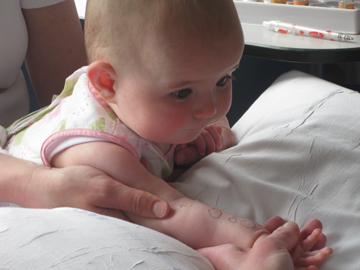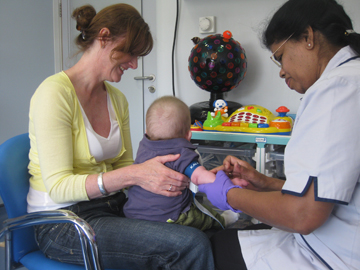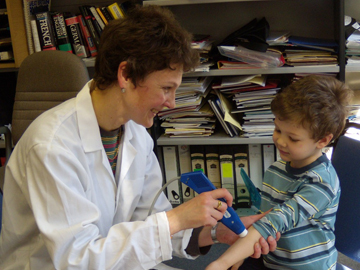The EAT Study is testing the hypothesis that the introduction of six allergenic foods into the diet of infants from 3 months of age, alongside continued breastfeeding, results in a reduced prevalence of food allergies by 3 years of age. This website explains why we are undertaking the EAT Study and what is involved for those participating. The Department of Health is fully aware of this study and recognizes this is an experimental study which is testing a scientifically important hypothesis. It is important to note that the study does not change the current general advice to mothers to exclusively breastfeed for around the first 6 months of an infant’s life. For any non-participants we advise adherence to the government’s current breastfeeding recommendations. Full details of these can be found at: www.breastfeeding.nhs.uk
What is the EAT Study?
The study is a randomized controlled trial of the early introduction of allergenic foods in a normal population. This means that the babies taking part in the study will be recruited from the general population and placed at random in one of two groups:
One group will introduce six allergenic foods from 3 months of age alongside continued breastfeeding, having been screened to check for pre-existing food allergy (Early Introduction Group).
The other group will follow present UK government weaning advice i.e. aim for exclusive breastfeeding for around six months (Standard Introduction Group).
The babies will be monitored until 3 years of age to see whether early diet has an effect in reducing the prevalence of food allergy. We initially aimed to have 2500 mothers and infants at 3 months of age enrolled into the study. The EAT Study is open to infants from the general population who meet the recruitment criteria. The majority of infants already taking part in the EAT Study are not from families with an increased risk of having children with allergies. A minority of partipating infants are from higher risk families and this has had the effect of reducing the number of mothers and infants we need to recruit to 1302.
All mothers will be encouraged to breastfeed exclusively until their infants are 3 months of age at which point they will attend the allergy research centre at St Thomas’ Hospital in London. In launching this study we have drawn on experiences of people from all over the world. For example, there are countries in Asia, Africa and the Middle East where peanuts are a regular part of an infant’s diet and yet peanut allergy is diagnosed far less often than in the UK, strengthening support for the hypothesis that the early introduction of allergenic foods may decrease the risk of food allergy. The study is being funded by two governmental bodies: the Food Standards Agency and the Medical Research Council. Because the EAT Study is a randomized study, assignment to one group or another is entirely left to chance, and neither parents nor doctors have any influence on this process.
What are the benefits of taking part in the study?
Ultimately we hope that all the treatments in this study will help your child; however there is no guarantee that your child will not develop a food allergy if they participate in the study. The information we get from this study may help us to prevent the development of food allergy in more children. In the same way as if they did not take part in the trial, any child who develops food allergy during the trial will be offered appropriate testing to confirm or refute the diagnosis. Usual follow up care with specialist doctors, nurses and dieticians will also be offered.
What happens if I take part?
If your child is assigned to the Early Introduction Group, you will be asked to continue to breastfeed your baby until at least 6 months of age. However, having checked that your baby has no evidence of having already developed a food allergy, you will also introduce first some baby rice and then some cow’s milk based yoghurt from 3 months of age. Subsequently, you will be asked to introduce some other foods in defined quantities – peanut butter, fish, wheat, eggs and sesame. By 5 months of age, in addition to still being breastfed, your child will be eating these foods twice a week. One of our dedicated dieticians will offer practical advice and guidance to help you understand how to introduce these foods into your child’s diet and in what quantities.
If your child is assigned to the Standard Introduction Group, you will be asked to follow the standard UK government weaning guidelines: aim for exclusive breastfeeding until around 6 months of age, and no early introduction (before six months) of certain allergenic foods (cow’s milk, peanuts, wheat, eggs and fish).
Clinic visits
Participation in the EAT Study will last until your child is 3 years of age. All children participating in the study will make three visits to St Thomas’. The first visit is when children are enrolled onto the study at 3 months of age. The second visit takes place at 1 year of age. We will then see all the children again when they finish the study at 3 years of age. All visits will take place at the Evelina Children’s Hospital at St Thomas’ Hospital in London and will last approximately two hours. Clinic visits allow EAT Study specialists to assess the health of each child and their progress in the study, as well as provide an opportunity for parents to raise any questions or concerns directly with the clinical study team.
You and your child’s participation in the EAT Study is voluntary and you will be free to withdraw at any time, without giving a reason and without the medical care given to you or your child or your legal rights being affected in any way.
Clinic procedures
A typical study visit will entail a physical examination including measuring your child’s height and weight, tests to determine whether your child is allergic to the allergenic foods, and the collection of blood samples for routine medical tests and for laboratory tests to assess your child’s immune system’s reaction to the foods. The doctors may also ask about medical and dietary histories of your child and family.
Specific tests undertaken include:
Skin prick testing

This involves a small amount of the allergen being placed onto the skin and then pricking the skin (it does not draw blood) (see photograph). If your child is allergic to any of the allergens being tested a small bump (hive) will develop within 5-15 minutes. This disappears after about 30 minutes.
Blood test
 The blood sample is used to help us to understand why some children develop food allergies and others do not. At the 3 month visit, mothers are encouraged to breast feed their baby prior to the blood test as this has been shown to be an effective way reducing the discomfort of the blood test for the baby. At the 1 year and 3 year visits, a local anaesthetic (‘numbing cream’) is applied to minimise discomfort and the blood will be taken by a dedicated paediatric phlebotomist (a specialist in taking blood) or a doctor (see photograph).
The blood sample is used to help us to understand why some children develop food allergies and others do not. At the 3 month visit, mothers are encouraged to breast feed their baby prior to the blood test as this has been shown to be an effective way reducing the discomfort of the blood test for the baby. At the 1 year and 3 year visits, a local anaesthetic (‘numbing cream’) is applied to minimise discomfort and the blood will be taken by a dedicated paediatric phlebotomist (a specialist in taking blood) or a doctor (see photograph).
TEWL measurement
 A baby’s skin provides a natural barrier against water loss. There is some evidence to suggest that children who lose more water than others across their skin have a tendency to develop dry skin and eczema. We will use a simple non-invasive device to measure the amount of water your child looses across the skin. This does not cause any discomfort and requires the non-invasive device to be held in place for about 2 minutes, until a stable reading is produced (see photograph).
A baby’s skin provides a natural barrier against water loss. There is some evidence to suggest that children who lose more water than others across their skin have a tendency to develop dry skin and eczema. We will use a simple non-invasive device to measure the amount of water your child looses across the skin. This does not cause any discomfort and requires the non-invasive device to be held in place for about 2 minutes, until a stable reading is produced (see photograph).
Infant microbiome - stool sample and skin swab
The microbiome is the name given to the collection of microorganisms that naturally live on our skin, in our saliva and mouth and in our bowels. There is growing evidence that the microbiome we have may be related to our chances of developing allergic conditions such as eczema. We wish to see whether it may be related to the chances of developing food allergies as well and what impact introducing foods early into the diet has on the microorgainisms that naturally live in our bowels.
With this in mind we are asking families to bring a dirty nappy with them to their 3 month and 1 year clinic visits where the study team will collect a stool sample from the nappy. This will be subsequently frozen and we plan to use modern techniques to look in detail at the pattern of microorganisms within it.
We would also like to collect one sample from when your infant is 5 months of age. For this we will give you a simple collection kit to use at home with full instructions. This will involve placing a sample from a fresh dirty nappy into a special container and posting it back to us using a prepaid guaranteed next day delivery service. This will require you taking the package to your local post office as the sample has to arrive with us as soon as possible after being produced by your infant!
As part of getting a clear a picture as possible of what your infant’s microbiome consists of we will take a skin swab at the 3 month and 1 year visit. This is a completely painless process and will not cause your infant any distress at all.
Dietary assessments
A key part of the EAT Study is recording the diet of the mother (during pregnancy and breast feeding) and of the child.
Food diaries
Parents will be asked to complete a food diary recording everything their child has eaten over a five day period at three points during the study (6 months, 1 year and 3 years of age).
Interim dietary assessments
Parents will be asked to complete a short dietary questionnaire (which will take no more than 10 to 15 minutes to complete) on line from home on a monthly basis between 3 months and one year of age and then 3 monthly until 3 years of age..




